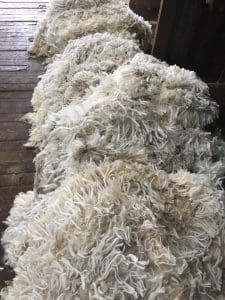 TIPS for classing wool from sheep affected by recent bushfires have been released by the Australian Wool Exchange.
TIPS for classing wool from sheep affected by recent bushfires have been released by the Australian Wool Exchange.
AWEX has been contacted regarding the potential and likely issues that will be faced by growers and classers in the wool shed as a result of the recent fires across most states.
AWEX wool classer registrar Fiona Raleigh said wool classers must have a strategy if they are going to be classing flocks that have been impacted by fire.
“Understanding the extent of the impact of the fire on a property is paramount to successfully classing fire affected wool in a clip,” she said
AWEX said given the extent of the recent fires in New South Wales, Victoria and South Australia, it is likely that this issue will become more common. There are a number of potential issues that classers may encounter from sheep that have been affected by the recent fire events, including:
- Wool that has been burnt (fibre damaged by fire),
- Wool that is singed where there is damage to the tip of the wool fibre, and/or
- Wool affected by charcoal from sheep running on burnt ground. The wool is not burnt but is discoloured with charcoal and ash. There is no physical damage to the fibre.
Classing strategies may include:
Keeping wool from affected mobs separate and class the affected mob using standard classing methods, or
Keep affected fleeces/parts of fleece within the mob separate to wool that is unaffected by fire or charcoal.
Example of classed lines:
Line 1- Unaffected wool.
Line 2- Charcoal affected wool, no damage to wool fibre.
Line 3- Burnt/singed wool, may also contain charcoal. There is damage to wool fibres.
AWEX does not recommend over classing of the clip. The mob concept should be applied, and classers should aim to optimise wool that is unaffected where possible.
Small portions of fire-affected wool should be consigned to Bulk Class as appropriate.
Buyer feedback indicates that charcoal is scourable; however; charcoal affected wool should be kept separate from wool that is not affected, AWEX said.
Classers should describe the wool using standard wool descriptions and identify using bins codes, noting the lines made for fire-affected wool on the wool classer specification in the classer’s comments.
Classers are advised not to use the description or comment of ‘black’ for burnt or charcoal-affected wool. Black is to describe pigmented wool only, AWEX said.



The guidelines seem sensible enough and as classers are fairly intelligent in my experience they would know what to say and what not to say without guidelines. However, guidelines rather reassure clients that a consistent approach has been recommended and can be anticipated in description. What is not addressed is smoke-affected wool as opposed to burnt wool. The effect of heat on lanolin has not been addressed either. I’d be interested to hear more about those two from AWEX. The effects on the wool fibres themselves owing to trauma, heat and diet change also has not been addressed. I wonder whether, apart from my observations, whether AWEX is overall trying to look managerial.
There are no guidelines issued for shearing fire-affected wool insofar for example on reduced natural lubrication, resultant heating of the cutter/comb which affects sheep and shearer and increased propensity for jamming. How many shearers would not have experience with fire-exposed sheep and what OHS should be professionally and scientifically discussed at the shed? The contractors association and union seem silent on safety and certainly are so on modern ‘improved’ shearing platforms which do not meet the theory behind the various workplace acts and regulations.